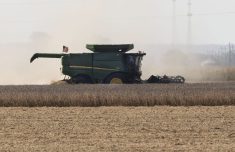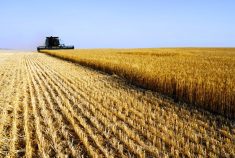Wetland drainage is likely responsible for most of the agricultural phosphorus that enters Lake Winnipeg each year, says a Ducks Unlimited spokesperson.
Greg Bruce, head of industry and government relations for Ducks Unlimited Canada, told a water workshop at the organization’s centre in Brandon March 20 that the phosphorus data is preliminary and must be vetted. Nonetheless, the research suggests wetland drainage in southwestern Manitoba contributes 900 tonnes of phosphorus annually to Lake Winnipeg.
If correct, that equates to 75 percent of the estimated 1,200 tonnes of phosphorus that flows into the lake each year from agricultural operations in the province.
Read Also

Alberta harvest wrapping up: report
Harvest operations advanced to 96 per cent complete in Alberta as of Oct. 7, with only a few late-seeded cereal and canola fields remaining, according to the latest provincial crop report.
“With the amount of the drainage that has gone on in southwest Manitoba over the last 37 years, we’ve lost in the order of 250,000 acres of wetlands,” Bruce said during a panel discussion at the workshop, organized by Ducks Unlimited, the Manitoba Conservation Districts Association (MCDA) and the Lake Winnipeg Foundation.
Ducks Unlimited analysis indicates that filling in marshes and sloughs in southwestern Manitoba’s prairie pothole region from 1968 to 2005 increased stream flows by 62 percent and peak flows by 37 percent.
In addition, the decimation of wetlands increased phosphorus loading by 32 percent, nitrogen loading by 57 percent and sediment loading by 85 percent.
“We’re suggesting that the loss of 250,000 acres of wetlands potentially contributes, or is the cause, of three-quarters of the agricultural loading to Lake Winnipeg,” Bruce said.
“Which makes a lot of sense. We’re moving the water (off the land) and in the water is all the phosphorous, all the nitrogen and all the sediment.”
Ducks Unlimited has formed a coalition with the MCDA and the Lake Winnipeg Foundation to convince landowners and policy makers in Manitoba to keep more water on the land.
Vicki Burns, outreach co-ordinator for the foundation, said retaining water on the landscape is a win-win-win option.
“(It) has the benefit of holding phosphorus so it doesn’t get into the lake, it has the benefit of decreasing the amount of water flowing over the land and (contributing) to flood situations and the benefit of holding on to water for potential drought situations.”
Most of the 50 people at the workshop, including conservationists, landowners and government representaives agreed holding water on the land is a sound idea. However, the problem is how.
Some Manitoba municipalities compensate landowners who don’t drain sloughs, which is based on the philosophy of paying farmers for environmental goods and services.
“I think that our group has some consensus … that the benefits of what we’re asking farmers to do are shared by all of society,” Burns said.
“Therefore, all of society should pay for it.”
Rob Brunel, who farms near Ste. Rose, Man., said some producers would maintain wetlands because it’s the right thing to do.
“But the scale (of the problem) requires incentives…. My farm doesn’t survive without generating income. So, if I’m going to displace soybeans or canola or wheat, I need to be compensated for that…. You’ll get so much water storage for free, but the rest will have to be paid for.”
However, Bruce said regulations are also needed to halt wetland drainage.
“That debate between reimbursing people … or regulations to prevent the destruction of natural ecosystems … that’s an ethical debate that generates a lot of lively debate. At that end of the day, I think we’ll end up looking at a mixture of tools.”
Workshop participants also discussed where to store water.
Marla Riekman, a Manitoba Agriculture land management specialist, said storing water on land with Class 1, 2 or 3 soil isn’t an option.
A producer at the meeting suggested farmers could drain the small sloughs on their land and store the water in a larger pond in the district.
However, Bruce said that kind of drainage, known as pothole consolidation, threatens ducks and other wildlife.
“I don’t dispute the (agricultural) efficiencies that would come along with that, but from a biodiversity point of view, (it) is a negative,” he said.
“You will lose biodiversity because you are losing a lot of (habitat) … which isn’t replaced by one, single large body of water.”

















